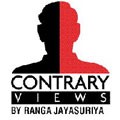PSC now a party affair
Last week, at the National Security Council meeting (NSC), IGP N.K. Illangakoon, delivered a presentation on the perils of delegating police powers to the Provincial Councils. Two guests were in the attendance, invited by President Mahinda Rajapaksa; they were Vasudeva Nanayakkara and D.E.W. Gunasekara, two pro-devolution ministers who had been the most vocal among all the left party Parliamentarians in the government, in their opposition to the proposed changes to the 13th Amendment. The two had earlier vowed, speaking to this newspaper that the combined Left in the government would vote against any constitutional amendment that would weaken the 13th Amendment. One notable absentee at the NSC, meeting was Prof. Tissa Vitharana, another minister and the previous Chairman of the All Party Representative Committee (APRC).
At the meeting, Inspector General of Police (IGP) Illangakoon was at pains to drive home the standard government position that delegating police power would pose a threat to national security. The only difference was that he was in uniform, but he sounded more like Wimal Weerawansa, the rabblerousing government minister and President’s loyalist. The IGP spoke in length about the inter-relations and complications of police powers vested with the Central Government and the Provinces. IGP Illangakoon also proposed that the APRC proposal on police powers be reconsidered, contending that it was detrimental to national security. However, during the meeting, some of his assertions were countered by Minister Nanayakkara. “I told him that some of his interpretations were incorrect,” Minister Nanayakkara told this newspaper, referring to the IGP’s reading on police powers.
‘Will agree or disagree’
However, sadly though, that is the dominant school of thought within the government, no matter how parochial it is. Among those in the audience were the President, his brother and powerful Defence Secretary Gotabhaya Rajapaksa, the three Service Chiefs and the IGP. In other words, the IGP was singing to his own choir.
At the end, Minister Nanayakkara suggested that the Parliamentary Select Committee (PSC) be allowed to deliberate on the 13th Amendment and evolve a consensus, drawing from the earlier report of the APRC.
“After the PSC presents its proposal, we will either agree or disagree with it. But, within the PSC, we will make sure our opinion is taken into account,” Minister Nanayakkara said.
Opinions don’t matter
However, as it appears, the opinion of Nanayakkara and his ilk does not matter for the government. The President and the main interlocutors of the government have made it known that the government would go ahead with the changes to the 13th Amendment, come hell or high water. The most recent to jump the bandwagon was the Chairman of the PSC, Minister Nimal Siripala de Silva, who last week in a public meeting in Kundasale said: “Devolution of powers does not solve problems.” He told the crowds that “the 13th Amendment was forced upon us and the time has come to amend it.”
Notwithstanding Minister Nanayakkara’s faith in the PSC, it is now confirmed that the entire Opposition would boycott it. The TNA announced their decision to boycott it on Saturday (29) night and the UNP has already made it known that the PSC without the TNA would be a futile affair. The JVP earlier announced that it would boycott the PSC. Worse still, the government has excluded its constituent party, the pro-devolution Sri Lanka Muslim Congress from the PSC. Among others who had been excluded from the PSC is former APRC Chairman, Prof. Tissa Vitharana, who is known for his support to the 13th Amendment.
The PSC will hold its maiden session on 9 July. However, in contrast to its original intention, it has now become an affair of the government’s nationalist bedfellows. Its outcome is a foregone conclusion. In a more realistic assessment, the appointment of the PSC was meant, more than to evolve a consensus on the matter, to generate credibility for the unilateral government manoeuvre. However, credibility is hardly likely to stem from what is now understood as a farcical majoritarian constitutional drafting exercise. If anything, the entire exercise is proof as to how low constitutional democracy has stooped to in the country.
However, in the absence of viable local mechanisms, norms and principled behaviour that serve as a bulwark of constitutionalism, there is one powerful external deterrent, which has now reasserted itself.
On the back foot
The Indian concerns over what is viewed as unilateral actions taken on the 13th Amendment, which is part and parcel of the Indo-Lanka Peace Accord, has not prompted the government to go on the back foot. Basil Rajapaksa, the powerful presidential brother and minister would leave for India on 4 July and is expected to meet Indian External Affairs Minister, Salman Khurshid, and National Security Adviser, Shiv Shankar Menon. The government has opted to describe that Minister Rajapaksa, known as a successful troubleshooter of his brother’s government, is visiting New Delhi to renew now stalled dialogue between New Delhi and President Rajapaksa’s trusted trio, Secretary to the President Lalith Weeratunga, Defence Secretary Gotabhaya Rajapaksa and Basil Rajapaksa. The Indian side was represented by the National Security Adviser, Defence Secretary and External Affairs Ministry Secretary.
However, Minister Rajapaksa’s visit is not as routine as the government has opted to portray it. Sri Lanka has been testing Indian patience for too long and has now pushed New Delhi beyond its limit of endurance. India has run out of patience and according to diplomatic sources, has apprised Colombo about its strong objections to the unilateral action over the 13th Amendment and that, if Colombo ignores India’s objections, it would face the consequences.
Should New Delhi decide to exercise its diplomatic and other muscles, Colombo, shunned by much of the civilized democracies, has little recourse. Notwithstanding the hefty ideas of sovereign equality, international politics has no deterrent to the big power intervention and indeed mandate it.
First Executive President, J.R. Jayewardene, learnt it the hard way. The incumbent should make sure to avoid a repeat of it
